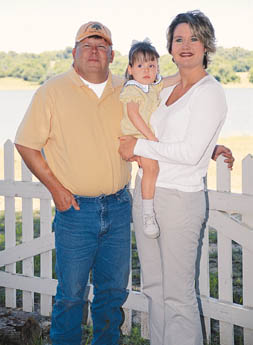Outstanding Young Farm Family – Catfish

When Wes Garner heads to his favorite fishing spot each Thursday morning, he’s got a lot more on his mind than reeling in a big one. He’s hoping that his catfish sample will pass the flavor test of the processing plant where the fish will eventually end up.Wes, 29, and his wife Lindsey, 23, operate Hannah Farms in Greene County near Boligee. The farm is named after their daughter, Hannah, who unlike her daddy, loves to fish.
“I don’t really care much for fishing, never have,” Wes said. “But I love the fish business; now that’s different. For recreation, I like to hunt and so does Lindsey. But the fish is where we make our living.”Each Thursday, armed with a Zebco 33 spinning reel and a slice of Slim Jim, Wes catches a flavor sample from each of the ponds he owns or manages. So far, the flavor has been good and so have the rewards for the young farm family.It’s that hard work that earned the Garners the title of Alabama’s 2001 Outstanding Young Farm Family in the catfish division. They own or manage 360 acres of catfish ponds on a total of 2,100 acres that’s also home to a commercial beef cattle operation.”This is our fifth year and should be our break-out year,” Wes said. “Catfish farming is something I’ve wanted to do a long time, and I decided the only way I was ever going to get to do it was to go to work for someone else first.”That desire led Wes to the farm of his neighbor, Dennis Herndon, who needed help with his catfish operation.”Mr. Herndon needed a night man to manage his ponds for him,” Wes recalled. “It was my job to check oxygen in the ponds at night. That’s how I really began learning about the business.”Wes also took on the job of looking after another neighbor’s fish farm, and in 1999, the Garners were able to buy their own 157-acre farm that already had three catfish ponds. The experience was just the avenue Wes said he needed to get a good start in the business.”I started with nothing,” he said. “But I feel like if I can do it, anyone can.”
Lindsey said she’s happy that she and Wes can raise their daughter on the farm. She comes from a farm family, and the fact that she can drive a tractor makes her valuable help around the farm from time to time.”I like living on the farm, and if it wasn’t for the physical labor, I could probably help out more,” she said. “The stuff that Wes and the others do is hard work. I mostly help out with the bookkeeping and paying the bills.”As the Garners began learning more about catfish farming, they also learned that there’s lots of things that can go wrong with a catfish farm.”You’ve absolutely got to manage your water quality,” Wes said. “If you don’t, you’ll fight it all year. The cooler water, usually about 67-70 degrees, is where you get the disease problems. Then once the temperature gets above 80 degrees, you can have oxygen problems. If you don’t manage your water quality, you won’t be in the catfish business very long.”Wes and Lindsey use the latest technology combined with hard work and intense management to keep their water quality in check. They also stock their ponds with threadfin shad to control off flavor.”There are some people who think that because we use chemicals to treat the ponds that it’s not safe,” Wes said. “But if they only knew what we were using is the same type chemicals that a municipal water plant uses to treat city water, they might think differently.”Wes said he’s optimistic that the catfish business will continue to grow, but he’s aware that foreign trade issues affect all farmers, even catfish farmers.”Right now, we’re really being hurt by the Vietnamese fish imports,” Wes said. “Some experts say that Vietnamese (catfish) fillets have taken 14 percent of the fillet market in the U.S. That’s hurt our price, and most consumers have no idea they are eating fish grown in Vietnam. The boxes the fish are shipped in come from the U.S. and it’s labeled ‘farm-raised catfish’.”Issues like that is where the Alabama Farmers Federation can help, Wes said. Educational programs on production and management as well as keeping farmers informed about trade issues and market conditions can make the difference, he added.Wes serves as chairman of the Greene County Young Farmers Committee. Their county often holds joint meetings with Hale County to create more interest among young farmers.”It’s good to be around other young farmers with similar interests,” Wes said. “We need all the encouragement we can get, and it helps to know other people are facing the same decisions and problems that you are.”
